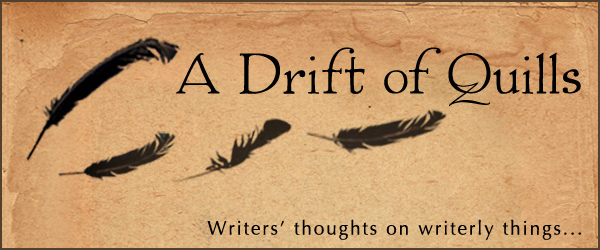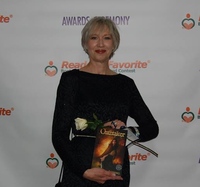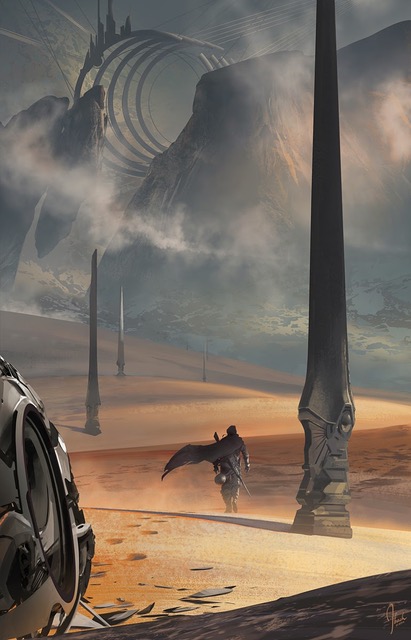
This month our little troupe of writers did something a bit different. We’re not telling you about our favorite books, or what the writing process looks like, or how we outline, or anything related. We’re not going to tell you about stories – this month we’re going to give you stories.
Flash fiction is short fiction, usually under 1,500 words, and is often a self-contained narrative. It’s a lot of fun, but incredibly difficult to get right. As a prompt, we all used the same picture, but the stories that emerged are as unique and different as their authors. We hope you enjoy this collection as much as we enjoyed writing them!
Below I’ve shared “The Prophet and the Assassin,” along with our image prompt, but before you get there, I’ve linked to Robin and Trish, who both have fascinating tales to tell…
 Robin Lythgoe
Robin Lythgoe
Author of As the Crow Flies
SIXES
The mages—along with the history books and a dozen or so scouts—had professed their absolute certainty that the Shaddar Needles no longer held any power.
Either they lied, or the maggots had figured a way to put them back in operation. Cleaved nearly in half, my flitter wrapped around the base of one pitch black, sword-like spire. Shock chased after shock. First, came the shattering of the sky like a thousand shards of lightning. Struck, I hurtled earthward, out of control. Glass jangled and metal shrieked. Unimaginable pressure and the sensation of tearing preceded the remainder of my flight—without the benefit of the flitter. I met the sand with ferocious force. Finally, and most astounding of all, came the realization that I still drew breath. Each inhalation burned like a hot poker, but by all rights, I should be dead.
Sprawled in the needle’s dubious shade, I processed the fact that I’d been thrown clear before my little flying machine slid down the length of the spire to smash to splinters against the ground. If I died, who would stop the poison spreading from the decaying city?
 Patricia Reding
Patricia Reding
Author of Oathtaker
Her Golden Hair
I had no choice. I had to leave her behind. Still, the ugly hands of guilt and grief, like the twin jaws of a vise, squeezed my heart.
I couldn’t count the times she’d saved me. I could only hope I’d prove as faithful. She deserved that . . . and so much more.
How could I have been so reckless? I’d heard the rumors of pirates having invaded the area—all from highly reputable sources, no less. Still I’d insisted on doing things my way. I alone was responsible for my foolhardy pride, my selfish desire to be the first to arrive, my rash behavior.
The vise crimped tighter . . .
 Parker Broaddus
Parker Broaddus
Author of A Hero’s Curse
Parker’s Website…oh wait. You’re already here.

Landships are usually a safe way to travel the dunes. Unless it’s a “clanker,” built from parts of the old combustible engines. They can’t go high enough to escape the desert sands that come out of the South like a solid wall of death. But it wasn’t the time of year for storms.
I’ve dreamed of starting over. I’ve dreamed of a fresh slate. It’s a myth. You can’t start over. The memories remain. The command remains.
There is no fresh slate for the living.
Our clanker got caught in a freak sandstorm. Our captain tried to outrun it. We were blown off course. My crewmates, all strangers to me, were lost, many of them succumbing to the gnawing wind, even before we went down.
I watched my candle burn low that night. I watched for the beauty of the dancing flame. It was simultaneously mesmerizing and frightening. It threw weird shadows around the interior of our broken wreck, highlighting the jagged edges and gaping holes open to the cold night. Its flicker should have invited monsters, or whatever survives in this wasteland—I counted on it—counted on them coming. Counted on dying. But nothing came, except morning. 
I wished I could sit and let death come, in whatever form it chose. Instead I staggered from the wreck, blinking at the weak, red sun which filtered through the dusty sky. On the horizon, irregular shapes broke the monotonous flat plain. Monsters or mountains, or a city. I walked. Through the day and into the night. I did not offer thanks for my life, as was our custom. Neither did I pray for death. I remained silent. I continued with no real thought for my end. Except perhaps some water. A light eventually attracted my attention. It flickered invitingly, like my candle. I adjusted course, a moth to the flame.
It was a cooking fire. A stranger stood, dressed in robes and shadow on the opposite side, unmoving as I made my approach. I paused on the edge of the light, waiting for a verdict, feeling the warmth. I hadn’t even noticed the cold of the desert night, until now.
The stranger stepped forward, into the circular glow. “You look tired.” Her voice and bronze colored features were that of a woman. Firelight glinted off her shaved head. Possibly a priestess of the An-Raj. I cleared my throat but a long day of dust and heat had put my tongue to shame. Nothing but a raspy hiss escaped. She tossed a skin of water across the distance between us.
We didn’t speak for some time. I sat and stared at the fire, content to see the dancing flame again.
“You’re a prophet of the Unnamed God,” she said. I glanced up, surprised. The corner of her mouth curved into a smile. “Few leave their hair and beard uncut in this region.”
“And what region is that?”
She pointed with her chin out at the desert. “Tajik is that way. Less than a day’s walk.” My face must have fallen because her grin grew large. “You aren’t fond of Tajik?”
I shrugged. “What is it to me?”
“I don’t know, Prophet. What is it to you?” The spit of meat over the fire dropped grease and sizzled in the quiet. “Come now. I have shared my food and drink with you.” Her teeth glinted in the light. “I haven’t even killed you, despite my profession.” I looked at her, curious. “Assassin,” she whispered, like a secret the desert could betray. Not a priestess then.
I shrugged again. “You are right as to my being a prophet.” I tucked my feet deeper under my rough, woolen robe and stretched my fingers toward the flame, welcoming the heat. “Tajik has attracted the attention of my God. Its oppression and cruelty to both persons and creatures cries out to the earth and has made its way to heaven.”
“But you don’t sound convinced.”
“I’ve never been to Tajik,” I said, evasive. She arched her eyebrows, but we ate in silence.
“So your sandship was on its way to Tajik?” she asked. A small pile of bones from her meal sat neatly beside her. She tossed them into the fire, one by one. “I assume it wrecked in the storm?”
“We were on our way to Sag.”
“Sag? That’s a long way from Tajik.” She studied me for a moment. “But you are going to Tajik now?”
“So it seems,” I replied, bitterness sharp in my voice.
“Will your God send a skybolt, like was done at Bathma, and Sid?” Her dark eyes flashed—but not with anger. “I’ve been there. There is nothing left but ash.” I wiped the grease from my mouth into my beard and shrugged. Her smile disappeared, replaced by a grim line. “I’ve heard of your God, Prophet. And I’ve heard of the prophets who are called by your God. They are known to have power. Strange, many of them. Living with birds in the desert, or wandering naked through the streets. But powerful, and speaking words of power.” She leaned forward. “But you—you seem to lack both power and conviction.”
She sat straight up then, proud and erect, her long neck coming out of her robe like a snake. “You act young, though you appear old. Take me. I hate who my master hates, and love who my master loves. When my master says, ‘Go,’ I go, and when my master says, ‘Come,’ I come.” She tilted her head, curious. “If you neither come, nor go, how can you be a prophet of the Unnamed God?” She threw the last of her pile of bones into the fire. “I am an assassin, Prophet—I need the favor of every god, especially a powerful one like yours. But I would not want you to pray for me.”
She was gone when I woke in the morning. I missed her water, all the way to Tajik. They say you can be defined by how you treat the lowest among you. In Tajik, the low did not live long. It was the only good they ever received. It was a city where nothing was sacred. I saw it. The numbness grew.
I told them of the skybolt, though I knew it would do no good. Nothing could save these people. The sky grew dark over the city, though it remained cloudless. From one end of the city to the other, I walked. I spoke. They didn’t touch me.
On the third day, an announcement was made by the regent of Tajik. It was as I was preparing to leave. I saw the greatest, the richest, and the strongest come out—I saw them picking the lowest out of the gutters, feeding them and clothing them. There was weeping and fasting. I even saw small children begging and pleading toward the dark sky.
I was surprised. But I didn’t care. Nothing could save them.
I left Tajik, and found an abandoned waytrain, rusted and heaped. It made a good watchtower. I had not seen a skybolt, only heard of them. Heard of the sky tearing open, and the bolt of death and destruction falling from above. Some call it God’s Fire.
Years ago, when I was first called as a prophet, one of the kings of the tri-mountain region laughed at my selection as a prophet and refused me entrance to his city.
No one would laugh at me now. Now that I had prophesied God’s Fire. I would be known for the destruction of Tajik—a great city. I would be known for the skybolt. Neither kings nor assassins could accuse me of lack of conviction and power. No one could accuse me.
I watched the sky, and Tajik. And Tajik changed. In a matter of days—hours even.
But it could not atone for all the cruelty and blood it had spilled. I felt the beat of the sun on my head and the tug of the wind on my cloak. The sky lightened, but I was not afraid. The skybolt would come. It couldn’t not come.
“Greetings, Prophet!” The assassin grinned at me. Her traveling cloak was dusty and her direction was in that of the city.
“They will not welcome you now.” My tone was sarcastic. “They are a new thing—they will not allow assassins.”
“I heard different. I heard they welcome all now, under a branch of peace. Quite a change, Prophet. Perhaps I underestimated your conviction.”
“The skybolt will still come. It cannot not come.”
She cocked her head, looking to the blue sky, and the bright sun. “Is that you speaking, or your God?”
I scowled, which made her laugh, her bronzed head thrown back and mouth open wide, white teeth flashing. “I’ve wondered since we met if you really were a prophet. But you have power in you, and you are strange. So perhaps I will let you pray for me after all.” Chuckling she left me, headed to Tajik.
That was long ago. Tajik still stands. They have not forgotten mercy, but they have forgotten me. Kings and assassins don’t know that I am a prophet. Powerful, and strange.
Oh, what fun! This would be a great start to a full-length work! Thank you, Parker, for sharing.
Pingback: A Drift of Quills: Flash! (Department of Stories) - Robin Lythgoe
I agree that it would make a wonderful novel. Wonderfully done!
Pingback: A Drift of Quills – Throwback Thursday - P.S. Broaddus